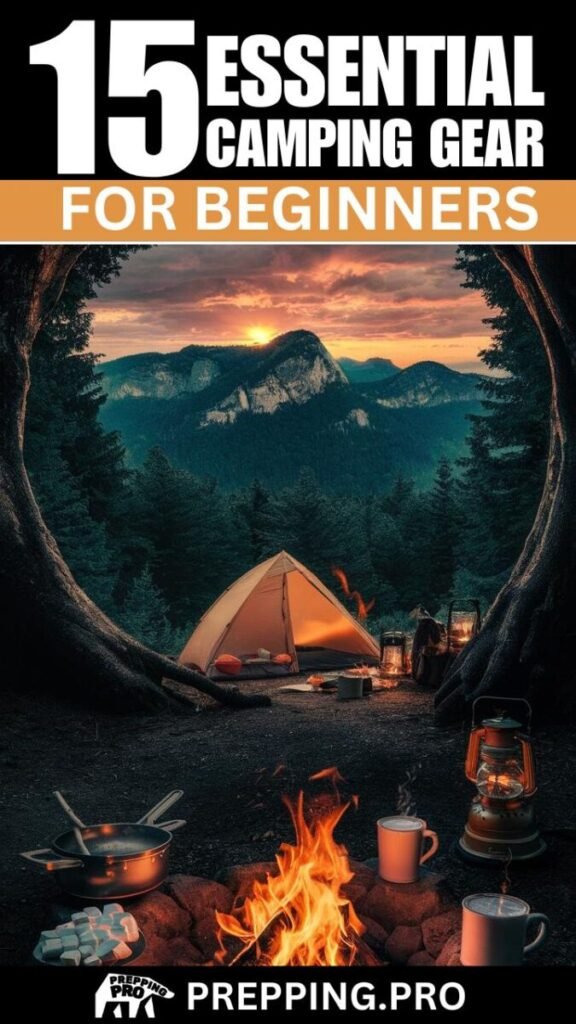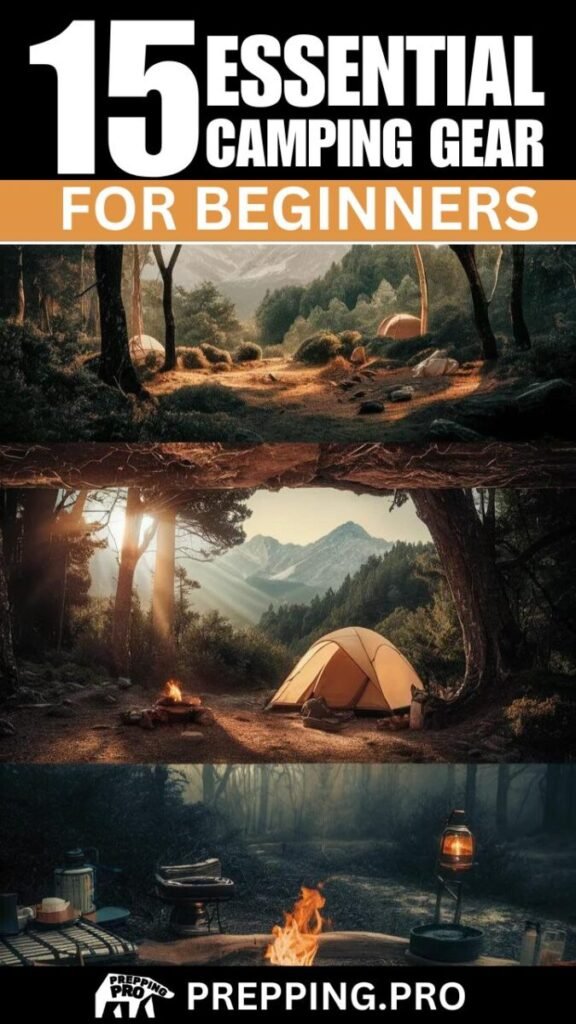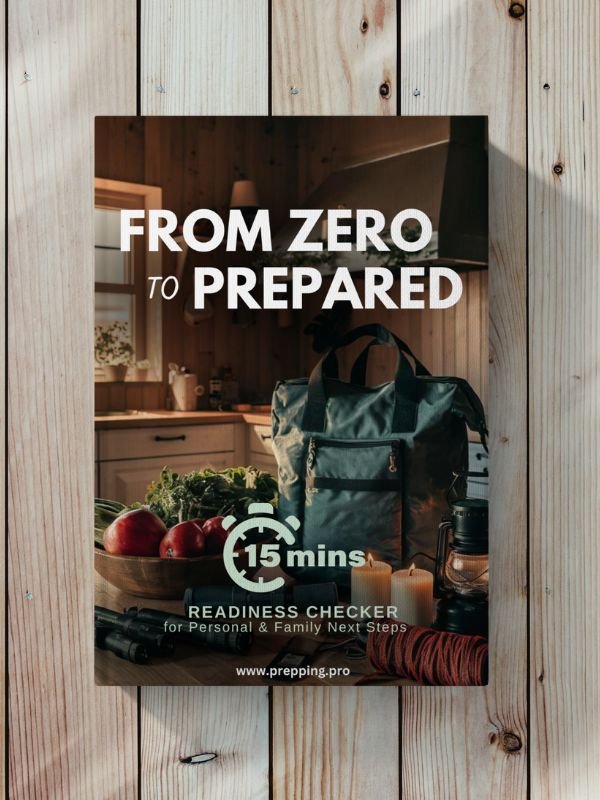Embarking on a camping adventure for the first time can be both exciting and daunting.
Proper preparation is key to ensuring a safe and enjoyable experience in the great outdoors.
This comprehensive guide to the 15 camping essentials for beginners will equip you with the knowledge and gear necessary to tackle any camping excursion confidently.
Key Takeaways
- Learn the 15 essential camping items every beginner needs for a safe and comfortable outdoor adventure
- Gain insights into selecting the right gear, from tents and sleeping bags to navigation tools and fire-starting equipment
- Discover tips for packing efficiently, staying protected, and minimizing your environmental impact while camping as a beginner
This article provides a comprehensive guide to the 15 camping essentials every beginner should have in their gear arsenal.
Table of Contents
Shelter

- A reliable shelter is paramount for any camping trip. It protects you from the elements and provides a comfortable space to rest and rejuvenate. When selecting a tent, consider the number of occupants, seasonality, and the tent’s weight and packability. For beginners, a three-season, two-person dome or cabin-style tent is a versatile choice. Manufacturers incorporate features like rainfly coverage, vestibules, and good ventilation to ensure comfort and protection.
- Key factors to consider when choosing a tent:
- Size and capacity
- Seasonality (three-season, four-season, etc.)
- Weight and packability
- Features (rainfly, vestibules, ventilation)
- Equally important is a quality sleeping bag and pad. The sleeping bag’s insulation and temperature rating should match the expected weather conditions. A warm, compressible bag with a good comfort rating is essential for a restful night’s sleep. Pair it with an insulated sleeping pad to provide cushioning and insulation from the cold ground.
| Sleeping Bag Temperature Ratings | Description |
|---|---|
| +35°F to +20°F | Best for summer camping |
| +20°F to +10°F | Ideal for spring and fall |
| +10°F to -10°F | Suitable for winter conditions |
| -10°F and lower | Recommended for extreme cold |
Cooking and Hydration

- Proper hydration and the ability to cook or boil water are crucial for any camping trip. A reliable camping stove is a must-have item. Liquid fuel and canister stoves are popular choices, with canister stoves being more convenient and lightweight for beginners. Always carry enough fuel and follow proper storage and usage guidelines.
- Canister stove advantages:
- Lightweight and compact
- Easy to use and maintain
- No priming required
- Ensuring access to safe drinking water is equally important. A water purifier or treatment system is essential for removing bacteria, protozoa, and viruses from untreated water sources. Popular options include chemical treatments, UV purifiers, and portable filters.
| Water Purifier Type | Suitable For | Advantages |
|---|---|---|
| Chemical treatments | Bacteria, protozoa | Lightweight, inexpensive |
| UV purifiers | Bacteria, protozoa, viruses | Fast, no aftertaste |
| Portable filters | Bacteria, protozoa, particulates | Effective, no chemicals |
Safety and Navigation

- Safety should be a top priority when camping, and having the right gear can make all the difference. A well-stocked first-aid kit is essential for treating minor injuries and addressing emergencies. Customize your kit with bandages, antiseptics, medications, and other items specific to your needs.
- Basic first-aid kit essentials:
- Adhesive bandages
- Antiseptic wipes
- Gauze pads and rolls
- Scissors and tweezers
- A reliable multi-tool or knife is indispensable for various camping tasks, from food preparation to setting up camp. Look for versatile options with pliers, screwdrivers, and various blade styles. Beginners may find a mid-sized multi-tool with essential tools and a locking blade suitable.
- Proper illumination is crucial for navigating in the dark and setting up camp after sunset. A high-quality flashlight or headlamp with adjustable brightness and long battery life is a must-have. Headlamps provide hands-free lighting, while flashlights offer more focused beams.
- Fire is essential for warmth, cooking, and signaling in emergencies. Carry multiple fire-starting methods, such as waterproof matches, lighters, and ferro rods, and practice using them before your trip.
- Navigation skills are vital, especially in remote areas. Always carry a map of the area and a compass, and learn how to use them properly. GPS devices and smartphone apps can be helpful but should never replace traditional navigation tools.
Clothing and Protection

- Staying dry and protected from the elements is crucial for comfort and safety while camping. A reliable rain jacket or poncho is a must-have item. Look for breathable, waterproof, and lightweight options with features like pit zips and adjustable hoods.
- Proper footwear is equally important. Hiking boots or shoes should provide ample support, traction, and waterproofing. Break them in before your trip to prevent blisters and discomfort.
- Key features to look for in hiking boots:
- Ankle support
- Aggressive tread for traction
- Waterproofing or water resistance
- Breathability
- Don’t forget to pack bug spray and sunscreen to protect against insects and harmful UV rays. Choose options with high efficacy and safe, eco-friendly formulations.
Packing and Organization

- A sturdy backpack or daypack is essential for carrying your gear comfortably. Consider factors like capacity, adjustability, and organizational features when selecting a pack. Properly distributing weight and keeping frequently used items accessible can make your camping experience more enjoyable.
- Important backpack features:
- Adjustable torso length and hip belt
- Compartments and pockets for organization
- Padded shoulder straps and back panel
- Ventilation and breathability
- Packing efficiently and keeping your gear organized can save valuable time and effort. Use stuff sacks, compression bags, and packing cubes to separate and protect your items. Make a checklist and pack essentials first, then add non-essentials as space allows.
Additional Considerations

- Before embarking on your camping trip, take the time to practice setting up your gear and test out new items. This will help you become familiar with their use and identify any potential issues or missing components.
Research and follow Leave No Trace principles to minimize your impact on the environment. Proper waste disposal, respecting wildlife, and leaving campsites as you found them are crucial for preserving natural areas.
Depending on your specific trip plans, you may want to consider additional items such as fishing gear, camp chairs, games, or other recreational equipment. However, for beginners, it’s best to start with the essentials and gradually add more specialized gear as you gain experience.
Conclusion
Camping can be an incredibly rewarding and rejuvenating experience, but proper preparation is key. By equipping yourself with the 15 essential items outlined in this article, you’ll be well on your way to a safe and enjoyable camping adventure.
Start with the basics, gradually build your gear collection, and continually adapt your skills to the great outdoors. With the right mindset and preparation, you’ll create lasting memories and develop a deeper appreciation for nature.
Remember, camping is an ongoing learning experience, and even the most experienced outdoorsmen continue to refine their techniques and gear choices. Embrace the journey, stay prepared, and enjoy the beauty of the wilderness.


